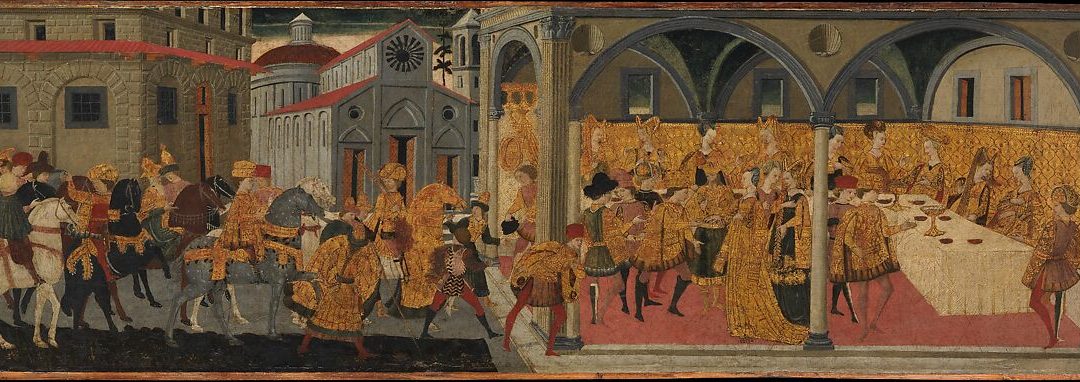
The Theological Psychology of Gregory the Great
Known best for the invention of the Gregorian chant, 800+ letters and tracts, and prolific Bible commentary, Gregory the Great wrote a short volume titled The Book of Pastoral Rule. I would not commend everything in the book, nor would I necessarily recommend it as an ideal pastoral handbook (he is the 6th c. Bishop of Rome after all).
But Gregory manages to open a window into pre-modern psychology. When I say “psychology,” I do not mean the stuff of Freud, Jung, or your therapist. I mean a theological psychology that takes for granted God, the immaterial soul, moral law, sin, and the gospel.
In discussing pastoral qualifications, Gregory glosses the psychology of curiosity, earthly cares, and shame. Below, I will look at what he has to say concerning each of these.
[For this article, I’ll be using a recent edition of The Book of Pastoral Rule, translated by George Demacopoulos. (Crestwood, NY: St. Vladimir’s Seminary Press, 2007)]
Gregory covers much more than what we will look at here. This is but a glimpse. But with limitations acknowledged, I’ll begin with the psychology of curiosity.
What Gregory describes might be called “distraction.” He doesn’t use the term curiosity. That designation is most popularly used in the work of Thomas Aquinas about 700 years later. And I think it’s helpful to use the word “curiosity” since it refers to such a culturally accepted vice. What makes Gregory’s words about curiosity psychological is that he not only describes it, but he offers a causal explanation for why it occurs. He says:
For when the mind involves itself more than is needful with external things, it is like [a man] who is so preoccupied on a long journey that he forgets where he is going. As a result, the mind is such a stranger to self-examination that it does not consider the damage that it suffers and is ignorant of the extent to which it errs.[2]
Gregory does much more here than simply define curiosity. He denominates and explains.
He denominates, because he mentions a particular species of distraction or curiosity, namely, a distraction from the reality of one’s own spiritual (and moral) state of being. Today, we’d call this “a lack of self-awareness.”
If you’ve ever interacted with or counseled a narcissist, you likely found that they are keenly aware of the failures of others, but entirely (and conveniently) aloof when it comes to their own failures—moral or otherwise. This is a fatal form of curiosity because it draws the subject away from an important God-given priority in life, i.e. spiritual discipline.
Gregory not only describes the nature of the distraction but seeks to explain it. It happens “when the mind involves itself more than is needful with external things…”
There are two things here: excess (intemperance) and subordinate matters. When a man over-indulges in less important matters (lower priorities) he is bound to be pulled away from that which matters most. In this case, he is drawn away from his own spiritual well-being to other things. This happens to such an extent that a person in such a state cannot perceive their own sin. And a person who does not see his or her own sin has virtually no need for the gospel.
The psychology of curiosity, for Gregory, seems to be an intemperance concerning what really matters—like a man who would trade the welfare of his children for promotion at work.
Psychology of Earthly Cares
Gregory describes another kind of cognitive disorder—earthly care. A man lacks awareness of higher matters by virtue of being “weighed down” through habitual vice. Commenting tropologically on the Mosaic law and its prohibition of certain bodily maladies, Gregory puts it this way:
The “hunchback”,” then, is one who feels the burden of worldly cares to such an extent that he never looks up to what is lofty but instead focuses entirely upon what is tread upon at the most base level. For this one, whenever he hears something good about the kingdom of heaven, is so weighed down by the burden of perverse habit that he does not raise the face of his heart because he cannot raise the posture of his thought, which the habit of earthly care keeps face down.[3] (Emphasis added)
Man is a body-soul composite.
Within the soul, there is the intellect and will. The body then supplies animal or sensitive appetites, which may be employed for the good so long as those appetites are brought under the control of the intellect and will. However, more often than not, our intellect is led by the lower appetites rather than the other way around.
Sin makes us think like beasts rather than men.
The preoccupation with “earthly cares” is explained by “perverse habit,” which invariably entails a prioritization of lower passions. When a man fails to control his lower passions through virtue, he will be influenced by outward, earthly stimuli—e.g. riches, sex, food—more than anything else. He “loses his mind,” as it were.
The man consumed by earthly cares has an ensnared heart or soul. Originally created to contemplate and enjoy God, the sinful man’s soul is enslaved to bodily passions. He cannot “rise” above what most pleases his senses, i.e. earthly things.
Psychology of Shame
Not leaving the previous context, per se, Gregory switches a small gear to those who delight in sinful thoughts. He describes this person as one who “is not carried away by sinful deeds, [but] his mind is entertained by lustful thoughts without any stings of repugnance.”[4] Gregory would likely grant that all sinners, including true Christians, struggle with taking pleasure in sinful thoughts. So he adds a qualifier. This is a person who doesn’t have a “struggle.” This is a person who goes without “any stings of repugnance.”
He elaborates:
A person, then, is ruptured when all of his thoughts sink to the level of lasciviousness, and he bears in his heart the weight of wickedness; and although he does not actively engage in shameful acts, nevertheless they are not purged from his mind. Moreover, he does not have the strength to raise himself to the discipline of good works because he is secretly weighed down by a shameful burden. (Emphasis added)
The psychological consequence of delighting in wicked thoughts is ethical impotence. The road to perdition is more like a downward spiral. As this man delights in wicked thoughts, he is less and less likely to turn the train around. The more he travels into the darkness, the dimmer the light gets.
When he thinks about turning his life around and tries to occupy himself with good works, the shame of his sin brings despair. His strategy becomes, “Well, I’m already here, I may as well remain.” Sin, in thought or deed, disposes a person away from God and toward more of their sin. This is why drug addictions rarely stop at marijuana, or why alcoholism is never limited to 4 beers a night. It’s why a porn addiction may turn into a real-life one-night-stand or long-term affair.
Sin has momentum. And part of this momentum is shame.
Shame is the burden one feels as a result of sins they’ve committed. And so long as that burden remains, there is very little incentive to turn things around. A homeless man learns to live without much food and no shelter. He becomes content with his station. Climbing out of the hole seems like nothing more than wishful thinking.
The effect the gospel has here cannot be underestimated. Shame is alleviated in the penal substitutionary atonement of Jesus Christ—where our sin is transferred to Him and dealt with for good. With the cleansing of the conscience following faith in the gospel, a door to renewal is flung wide open.
Conclusion
In pre-modern figures like Gregory, we find a thorough analysis of the whole man. It’s diagnostic, yet it’s far from secular. It’s neither materialistic nor naturalistic. Scripture plays a central role in his approach. At the same time, he doesn’t merely regurgitate biblical data expecting the reader to crunch it like a calculator or a computer. He deals with various aspects of man’s soul. He deals with the whole man. And this is par the course for pre-modern figures.
Speaking in a broad sense, the work of theological retrieval has much to offer in the area of anthropology. More specifically, however, it may also have much to offer in the field of Christian counseling or even clinical psychology.
Resources:
[1] Frederick Wilhelmsen, Man’s Knowledge of Reality, (Brooklyn, NY: Angelico Press, 2021), 3. He writes, “There is no distinct science of epistemology in the Thomistic sense of science.”
[2] Gregory the Great, The Book of Pastoral Rule, (Crestwood, NY: St. Vladimir’s Seminary Press, 2007), 34.
[3] Gregory, The Book of Pastoral Rule, 46.
[4] Gregory, The Book of Pastoral Rule, 48.





